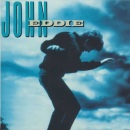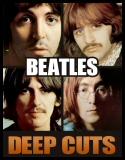Music Home / Entertainment Channel / Bullz-Eye Home
 Buy your copy from Amazon.com
Buy your copy from Amazon.com
| John Eddie: John Eddie Released: 1986 |
Hey Mrs. Jackson, man, I know it's late,
It's about your daughter now, and it can't wait.
See I'm her boy, if you don't approve,
It's my town, toots; if you don't like it, move.
'Cause I'm a jungle boy
The year was 1986, and the search was on for the Next Bruce Springsteen. Though The Boss had been critically lauded for years, and his releases had sold respectably, 1984's Born in the U.S.A. shot Springsteen into the stratosphere -- he went from damn fine songwriter to Bona Fide Rock Icon. You simply couldn't escape the juggernaut. Number One single followed Number One single, forging a chain that surely would have been record-breaking had Springsteen not decided -- in a gesture of magnanimity befitting the newly crowned King of Rock & Roll -- to leave himself one chart-topping single shy of the mark set by Michael Jackson only the previous year. Even the President of the United States sought room on Springsteen's coattails, co-opting “Born in the U.S.A.” as a theme for his re-election campaign. The song, of course, had little to do with anything Reagan stood for -- no one associated with the campaign had bothered to listen past its ringing chorus far enough to hear the bitterness, the broken dreams, the scathing indictment of American involvement in (and domestic policy post-) Vietnam.
This was Springsteen's problem, post-“U.S.A.” -- he became public domain, and in the process, the subtleties of his music were lost. To anyone who really cared about his songs, Springsteen was a master storyteller who could make you believe he'd walked in your shoes. He populated his songs with hard luck cases and noble failures, effectively shading the gulf between dreams and reality, rich and poor, what's right and what must be done to survive. He took the social conscience of Woody Guthrie and Pete Seeger and wedded it to bombastic, sweaty, joyous rock & roll, understanding (instinctively or otherwise) that no matter how bleak things seem, that driving 4/4 beat never loses its redemptive power.
But to casual listeners (and, not coincidentally, to the bean-counters at every major record label in the country), Springsteen was just barroom rock & roll, easily replicated by any group of guys with sufficient volume and swagger. Like Dylan before him, Springsteen unwittingly unleashed a tidal wave of soundalikes and pretenders, either by their own design or the label's. In some cases, this was truly unfortunate; it was patently obvious that the artist in question was being strapped into engineer boots and a tight pair of jeans, forced to sling his guitar low and adopt the requisite 'tude. Such an artist was John Eddie.
Like Springsteen, Eddie was from New Jersey. In fact, the two were friends (and labelmates -- Columbia Records apparently figured that if anyone was going to release a Springsteen knockoff, it might as well be them). Looking at the cover of Eddie's self-titled debut, you can almost picture the boardroom meetings. "Get those jeans tighter! Turn his fucking collar up! And tell the goddamn stylist I want his hair just messed up enough that he doesn't look like he cares how he looks. Or do I need to do all this myself?"
And the music? Well, the songs aren't half bad. Okay, Eddie runs through just about every 1980s rock cliché you could think of. He's got a song with the word "rebel" in the title ("Pretty Little Rebel") and a song about being just some guy ("Just Some Guy") and a song with the girl's name in the title ("Please Jodi") and a song about being all macho and stuff ("Jungle Boy"). It's all processed to within an inch of its life, another victim of the psychosis that gripped the music world between 1980 and 1991, robbing every producer and engineer of the ability to properly track a drum or acoustic guitar. (Springsteen got around this on Nebraska, but only by recording the album himself.)
But it should have been a hit. As derivative, badly produced records go, John Eddie is pretty good -- vocally, he's Eddie Money with talent; the band is competent, if not empathetic; and though the production sounds dated now, it was state-of-the-art rock & roll in 1986. "Jungle Boy" petered out halfway up Billboard's Hot 100, though, and Columbia gave up. Eddie recorded a few more albums for Elektra and MCA, but he'd already whiffed on the brass ring, and he eventually settled into the kind of critically lauded obscurity that results in distribution deals with Lost Highway Records, album titles like Who the Hell is John Eddie?, and tours opening for Lisa Marie goddamn Presley
Well. I, for one, salute you, John Eddie, and every other good-hearted rock & roll dreamer who was tricked by an A&R douchebag into doing something that killed his career. A toast to you, John Eddie, and all who came before and after you. Salud!
jeffg@bullz-eye.com






